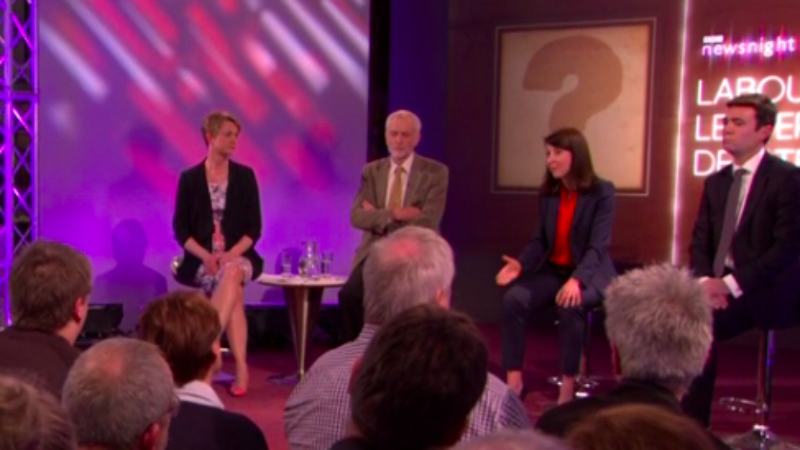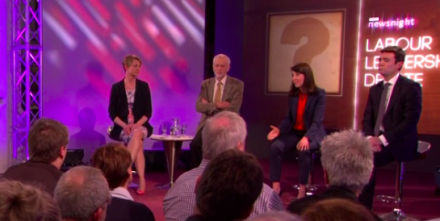

Last August, I interviewed Jeremy Corbyn, who was by then the frontrunner in the Labour leadership contest. In the half hour before a huge campaign rally in Cardiff, we discussed electoral strategy, the Tories’ record, how to take on the SNP – as well as internal matters such as policy-making and leadership elections.
You can read my write up of the interview here.
On the topic of leadership contests, we spoke about his view that a leader should face re-election every one or two years, which he had mentioned in an early leadership hustings on the BBC.
In our chat, I asked Corbyn for his views on the best system for doing this. He cited the 1988 challenge Tony Benn made against Neil Kinnock as a potential model – which will be of interest to those who claim it as a precedent for an incumbent leader needing nominations to be on the ballot. He also noted that after the Collins Review, “the Parliamentary Labour Party’s role in all this is limited to being the gatekeepers of the campaign”.
He added that “I don’t necessarily have the last word on all this”, and argued that “you could do it lots of ways”.
Ahead of this afternoon’s crunch NEC meeting, here is the transcript of our conversation about leadership contests:
CP: At the Newsnight debate back in June, I think it was, you said that you would like to see a Labour leader face re-election every year or two years, to improve the democracy of the party and the labour movement. What do you think is the best system for doing that? Would that be through conference?
JC: There used to be originally a system where the Labour leader was theoretically elected every year, but it was hardly ever challenged.
CP: I think that was through conference wasn’t it?
JC: No, it was a wider election, because from… [Corbyn ally and Momentum founder] Jon Lansman I’m sure would know the answer to this question, is he still there or has he gone?
CP: I can’t see him, actually.
JC: I’m sure he would know the answer. [To third party walking past] Is Jon still around?
Other person: John McDonnell?
JC: Jon Lansman.
Other person: Lansman, he’s downstairs on the stall.
JC: We have a question for him.
CP: I can chase him up later.
JC: No we’ll get him to come up, he’ll know the answer straightaway.
As far as I recall it, it was an annual election after the party changes in the early ‘80s, and that’s how there was a challenge to Kinnock in ’88 by Benn and Heffer.
Then after the election of Blair in ’94, ’93 sorry, ’93, the system was then changed. I don’t see why the party should be denied the right to elect people to senior office.
CP: Wouldn’t it be very expensive…?
JC: Well…
CP: Send us bankrupt?
JC: [Pause] Yeah, but there is a democratic issue involved, you could do it lots of ways. I just feel the leadership of the party and the Parliamentary Labour Party should be more accountable to the party and the movement as a whole. I don’t necessarily have the last word on all this, but I just feel there has to be a principle of accountability about what goes on.
Other socialist parties in Europe don’t have such hang ups about this. The SDP in Germany doesn’t, the French Socialist Party doesn’t, Die Linke in Germany has quite open election processes. There’s quite a lot. I just think there’s an issue of accountability.
The difference in this campaign, and this is the interesting point about it, it’s a wider franchise, it involves very much larger numbers of people than any other previous election, and the Parliamentary Labour Party’s role in all this is limited to being the gatekeepers of the campaign. Now I realise that gate was barely opened in my case, but y’know…
CP: Just open enough to get through!
JC: [Laughs] It was open enough to squeeze through, so we got through.
So I just think the principles of accountability and greater democracy in our party are important.




More from LabourList
Scottish Parliament elections 2026: Full list of Labour candidates for Holyrood
‘As metro mayors gain power, Labour must tighten political accountability’
Letters to the Editor – week ending 22 February 2026